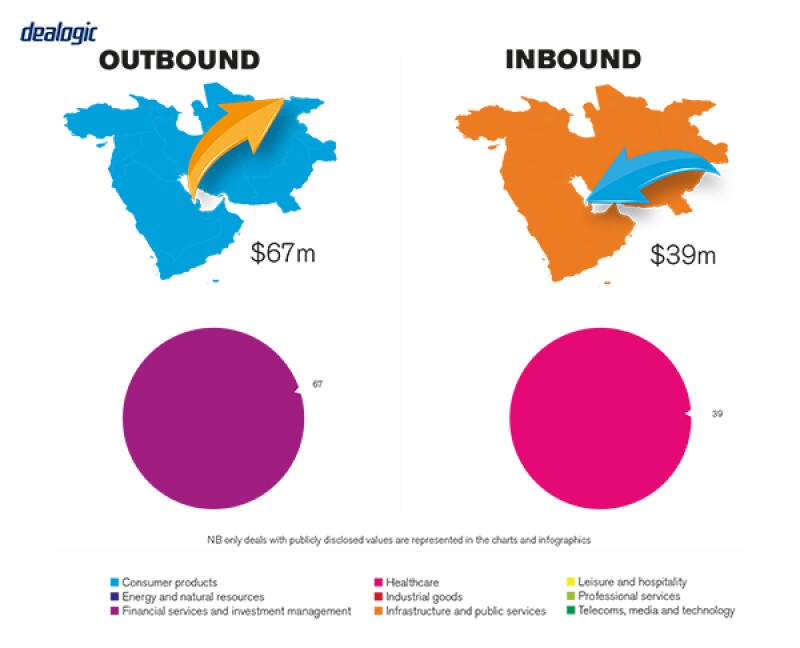Paul Day and Steven Brown, ASAR – Al Ruwayeh & Partners
MARKET OVERVIEW
The trend of consolidation within the highly fragmented financial industry has picked up pace since 2018 and there are a number of publicised mergers (in the form of public takeovers) expected to occur in 2019. The market from 2018 generally saw internal restructuring within financial institutions to deal with the ongoing implementation of Basel III; however, consolidation appears necessary to allow the financial industry to obtain adequate capital under the more stringent regulations. We expect to see increased M&A activity in the hospitality, education and real estate sectors. M&A activity in the education sector has increased; however, regulatory policies and hurdles have stunted what might otherwise have been a robust industry for private M&A. There also appears to be a shift, in which existing owners are exiting a more volatile market while buyers with a different risk temperments are willing to invest in existing entities.
M&A activity
The pace of M&A activity in 2018 remained broadly in line with 2017. The announcement of the proposed acquisition of Ahli United Bank BSC by Kuwait Finance House KSPC represents the largest deal in play for 2019. Since Kuwait Finance House has a wholly owned subsidiary in Bahrain, we would expect the merger during 2019 or 2020, insofar as a 100% takeover is accomplished. We saw the deal flow expand near the end of 2018 and expect this to continue throughout the year after a slow start to 2018. We note that global M&A has had an increasing impact on the Bahrain market as local subsidiaries are transferred under the umbrella of global transactions.
As in previous years, the market has been driven primarily by private M&A transactions, since public M&A activity is still relatively infrequent. This dynamic may be related to the high ownership concentration in most listed companies and scarcity of liquidity on the Bahrain Bourse. A significant change in these dynamics could be triggered by a partial privatisation by the government of certain companies, which would at the same time boost market liquidity and reduce ownership concentration with positive effects on public M&A activity.
TRANSACTION STRUCTURES
Widening valuation gaps between seller side and buyer side are denting liquidity in the domestic M&A market and this negatively impacts deal volumes. Nevertheless, the downgrading of the sovereign debt rating for Bahrain has pushed entities to reconsider the territorial risk factors associated with business in Bahrain. As a result, foreign interest in acquisitions have changed in nature while leverage factors are also being affected.
Financial investors
We are seeing less investment activity by private equity in Bahrain, likely relating to the territorial risks in Bahrain and the impact of VAT, which may depress the type of fast growth demands placed by private equity. For the most part, investors tend to be regional or global strategic investors seeking a majority or 100% stake in the target and driven by an expectations of creating greater efficiency than is being accomplished by primarily local sellers.
Recent transactions
The aforementioned Kuwait Finance House / Ahli United Bank transaction appears likely to involve a voluntary tender offer, regulated under Volume 6 of the Rulebook published by the Central Bank of Bahrain. We understand that use of share swaps rather than cash consideration are more likely from a structuring standpoint. This was the structure used in the 2018 United Gulf Bank restructuring. We also note that the Gulf Hotels acquisition of Bahrain Tourism Company in 2016 has shone a spotlight on the regulatory environment for public M&A, including raising questions about the appropriate manner for implementation. Similarly, the merger between Al Salam Bank and BMI in 2014 continues to inform the process for M&A involving conventional and Islamic banks and the complications that can arise.
LEGISLATION AND POLICY CHANGES
The Takeover, Mergers and Acquisitions Module (TMA Regulation) of Volume 6 of the Rulebook (Rulebook 6) issued by the Central Bank of Bahrain (CBB) is the primary governing regulation for public M&A in Bahrain and it works in conjunction with other regulations issued under Rulebook 6. It applies where there is an acquisition or consolidation of control of a Bahrain-domiciled publicly listed company; or an overseas company whose primary listing of equity securities is on a Bahrain exchange. Rulebook 6, including the TMA Regulation, is administered by the Capital Markets Supervision Directorate at the CBB. Private M&A, as such, is not a regulated activity beyond the registration of share transfers and transfers of business premises, outlined primarily in Bahrain's Commercial Companies Law.
Recent changes in law
A recent amendment to the Commercial Companies Law has made the partial acquisition of a closely held target significantly more complicated. Previously, persisting partners' mechanisms to exclude potential new investors operated by a statutory right of first refusal which, if not exercised, entitled the seller to transfer its shares. Under the amended law, any partner has a veto right in respect of any new potential investor. We also note that Bahrain has introduced a new Bankruptcy Code and a Personal Data Protection (PDPA) statute. The former came into effect in December 2018, and it is unclear what impact this may have on M&A work in Bahrain. The bankruptcy statute appears to enhance the opportunity for reorganisation (akin to a US Chapter 11 bankruptcy) and includes a debtor in possession (DIP) concept. The PDPA will be implemented in August 2019 and closely follows the EU data protection structure. In light of the PDPAs recency, we are unsure how this will impact M&A.
Finally, Bahrain implemented VAT from January 1 2019. As this was contemplated under the GCC VAT framework agreement, we anticipate any any impacts were being felt since before 2018.
Regulatory changes under discussion
We are not aware of any impending legislation at this point. The Secured Transacton Law and Close-out Netting Law, each of which were contemplated in the IFLR M&A Report 2018, have vanished from the public eye and may not be enacted during 2019.
MARKET NORMS
One common mistake is to structure and implement M&A deals following schemes and solutions developed in overseas jurisdictions without paying the necessary attention to the local legal and regulatory framework, both in cases of cross jurisdiction and of purely domestic transactions. This mistake can go unnoticed insofar as no conflict arises between vendor and buyer, though this may result in the completion process conflicting with local regulations. If a conflict arises, the pitfalls of such approach become readily intelligible and include a difficulty in obtaining legal redress in the local jurisdiction, uncertainties surrounding application of foreign law provisions in domestic court proceedings and impasse to meeting local requirements for completion.
Frequently overlooked areas
Post-closing activities are often an overlooked area as action plans and timelines are typically drawn up to the closing date, leaving post-closing activities to proceed without a clear structure, sometimes even managed by a team that did not work on the deal. This neglect often subsists notwithstanding the number and importance of post-closing activities which are often implicated (such changes to public registers which cannot be completed at closing, etc). Transitional services arrangements involving continued seller involvement are common but may have dubious validity and enforceability.
PUBLIC M&A
Obtaining control of a public company often involves the launch of a public tender offer (whether on a voluntary or a mandatory basis) unless de facto control is achieved by the acquisition of less than 30% of the target company voting share capital. The threshold triggering an obligation to launch a mandatory offer is set at 30% of the voting share capital of the target company, while further thresholds are contemplated for any incremental purchase between 30% and 50% of the voting share capital occurring within a specified timeframe. The launch of a voluntary or mandatory tender offer is accompanied with the publication of an offer document containing all information required under Module TMS of Volume 6 of the Rulebook published by the CBB and subject to CBB approval.
Conditions for a public takeover
Usually, conditions attached to an offer include levels of acceptance, approval of shareholders for the issue of new shares and listing/regulatory approvals. A voluntary offer must not be made subject to conditions whose fulfillment depends on the subjective interpretation or judgment by the bidder or lies in the bidder's hands. Once a firm intention to make an offer is formally announced, the bidder is committed to proceed. Scope to withdraw by invoking the conditions to the offer is limited. To the extent that the bidder intends to attach conditions other than normal conditions, the CBB must be previously consulted. As a general rule with limited exceptions, financing for an offer must be fully committed when the announcement of the firm intention to make an offer is made.
Break fees
Break-fees are not used in Bahrain and their validity is uncertain, as a commitment to a break-up fee can be seen as unlawfully impinging upon each shareholder's right to decide whether to sell or retain shares. In the absence of more legal clarity as to the permissibility of break-up fees, we do not expect that this instrument will be adopted in the structuring of public M&A deals.

PRIVATE M&A
The use of completion accounts is still the prevailing consideration mechanism in the realm of private M&A, though the financial data tracked for the purposes of determining any price adjustment with respect to the headline purchase price vary from working capital only adjustments to full-fledged adjustments based on net worth variations. Locked-box mechanisms are still relatively uncommon, though we expect to see an increase use of such mechanisms especially in the context of vendor-initiate private auctions. We have seen an increase in the use of earn-outs in private M&A, and believe these are being used as a tool for bridging widening valuation gaps between seller sides and buyer sides. Most notably, we see the use of earn-outs in price-control linked industries (such as education, whose tuition increases are subject to regulatory approval). Escrows are very common and are mostly used in connection with management of claims against representations and warranties.
Conditions for a private takeover
Regulatory approvals are invariably attached to private offers in respect of target companies operating in regulated industries. It is also not uncommon to find MAC clauses associated with specific quantitative metrics, though same are usually bitterly negotiated. It is quite common to bring down all representations and warranties to closing so that any breach (or material breach) of them may give a deal exit to the buyer.
Foreign governing law
It is a rather common practice to use a foreign governing law, albeit we strongly advise against the use of foreign jurisdiction clauses in M&A transactions in light of the enforceability issues that they can give rise to. Where a foreign governing law is used, foreign arbitration should be seen as a must, due to the problems in proving the provisions of a foreign law before a Bahraini court and the difficulties of the enforcement of foreign court decisions in Bahrain. Bahrain governing law with Bahrain court enforcement may be valuable to facilitate the enforcement of local obligations associated with the transaction and may be favourable for a foreign party that received robust local law advice against a Bahraini counterparty.
The exit environment
The exit environment is very challenging. The main exit channel still consists in a private sale to an industrial or private equity purchaser. The IPO exit route is uncommon in light of structural liquidity issues affecting the local capital markets, though recent developments, such as the Bahrain Investment Market launched by Bahrain Bourse, may enhance the possibilities for an exit through public offer in the local market. Sales to financial sponsors are also often unviable because of the reluctance by financial sponsors to take on balance sheet equities in light of the penalising capital treatment that this asset class receives under the newly implemented capital adequacy regulations. Finally, restrictions on introducing new partners into closely held LLC entities make exit infeasible without full shareholder cooperation.
OUTLOOK
We expect that consolidation in the financial industry will continue, propelled by structural reasons beyond the existing economic cycle. The level of success in the impending Kuwait Finance House / Ahli United Bank transaction will be extremely telling with regards to the ability of major consolidation in the public sector to occur. The risks associated with the sovereign debt downgrade will continue to be felt, but these may increase the volume of M&A in Bahrain as the demographics of investors changes. We expect market practice to embrace innovative structuring options to face persistent liquidity challenges, and we also expect that new legislation, which is in the making, will be generally be positive for the M&A market. We understand that a push for democratising debt and preferred share financing could incubate further M&A and IPO opportunities.
About the author |
||

|
|
Paul Day Partner, ASAR – Al Ruwayeh & Partners Kuwait City, Kuwait T: +965 2292 2700 F: + 965 2245 3597 Paul Day is a partner at ASAR – Al Ruwayeh & Partners (ASAR) and works primarily in the corporate and commercial field. He has extensive experience in commercial transactions and has negotiated and acted as lead counsel on numerous international joint-ventures. He represents a board range of prominent foreign clients in the establishment of a local presence and on legal and practical considerations relevant to foreign companies with operations in the Gulf region. |
About the author |
||

|
|
Steven Brown Partner, ASAR – Al Ruwayeh & Partners Manama, Bahrain T: + 973 17 533 182 F: +973 17 533 185 Steven Brown is the managing partner of the Bahrain office at ASAR – Al Ruwayeh & Partners (ASAR) and works primarily in the corporate and financial fields. He has broad knowledge and experience in corporate law, including governance and compliance of public and regulated entities. He also leads the Bahrain finance practice. He has been involved in numerous banking and finance transactions, local and cross-border acquisitions and transaction structuring in Bahrain. His M&A experience includes acting as lead and local counsel on various transactions representing buyers, sellers and targets in addition to assisting underwriters and financiers on public entity transactions. |

